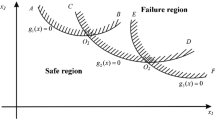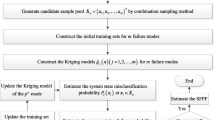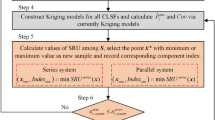Abstract
Global reliability sensitivity index measures the effect of uncertainty of model input on model failure probability, which is critical for simplifying analysis model and the reliability-based design optimization model. For efficiently estimating the global reliability sensitivity index of each model input, this paper transforms it into estimating an unconditional failure probability and a two failure modes-based parallel system failure probability from the perspective of single-loop estimation method. Furthermore, the relationship of computational accuracy among the global reliability sensitivity index, the unconditional failure probability, and the two failure modes-based system failure probability is constructed, on which the error stopping criterion-based sequentially adaptive Kriging model approach is developed to significantly decrease the number of calls to the actual limit state functions and the corresponding computational time under the sufficient accuracy. Results of three case studies covering explicit and implicit limit state functions demonstrate the accuracy and efficiency of the proposed method.








Similar content being viewed by others
References
Assaf SA, Zirkle LD (1976) Approximate analysis of non-linear stochastic systems. Int J Control 23(4):477–492
Barabesi L, Fattorini L (2002) Kernel estimators of probability density functions by ranked-set sampling. Commun Stat-Theory Methods 31(4):597–610
Bichon BJ, Eldred MS, Swiler LP et al (2008) Efficient global reliability analysis for nonlinear implicit performance function. AIAA J 46:2459–2568
Bierig C, Chernov A (2016) Approximation of probability density functions by the multilevel Monte Carlo maximum entropy method. J Comput Phys 314:661–681
China Aeronautical Materials Handbook (2001) The second edition, Beijing, Standards Press of China
Echard B, Gayton N, Lemaire M (2011) AK-MCS: An active learning reliability method combining Kriging and Monte Carlo Simulation. Struct Saf 33:145–154
Echard B, Gayton N, Lemaire M et al (2013) A combined importance sampling and Kriging reliability method for small failure probabilities with time-demanding numerical models. Reliab Eng Syst Saf 111:232–240
Feng KX, Lu ZZ, Chen ZB et al (2023) An innovative Bayesian updating method for laminated composite structures under evidence uncertainty. Compos Struct 304:116429
Gao HF, Zio E, Wang AJ et al (2020) Probabilistic-based combined high and low cycle fatigue assessment for turbine blades using a substructure-based Kriging surrogate model. Aerosp Sci Technol 104:105957
He LL, Lu ZZ, Feng KX (2019) A novel estimation method for failure-probability-based sensitivity by conditional probability theorem. Struct Multidisc Optim 61:1589–1602
Hristov PO, Diazdelao FA (2023) Subset simulation for probabilistic computer models. Appl Math Model 120:769–785
Hu Z, Mahadevan S (2016) A single-loop Kriging surrogate modeling for time-dependent reliability analysis. J Mech Des 138:061406
Keshtegar B, Meng Z (2017) A hybrid relaxed first-order reliability method for efficient structural reliability analysis. Struct Saf 66:84–93
Li LY, Lu ZZ, Feng J et al (2012) Moment-independent importance measure of basic variable and its state dependent parameter solution. Struct Saf 38:40–47
Li G, He WX, Zeng Y (2019a) An improved maximum entropy method vis fractional moments with Laplace transform for reliability analysis. Struct Multidisc Optim 59(4):1301–1320
Li LY, Papaioannou I, Straub D (2019b) Global reliability sensitivity estimation based on failure samples. Struct Saf 81:101871
Liu JS. Monte Carlo strategies in scientific computing, New York, 2001.
Lu ZH, Hu DZ, Zhang YG (2017) Second-order fourth moment method for structural reliability. J Eng Mech 143:06016010
Rosario ZD, Iaccarino G, Fenrich RW (2019) Fast precision margin with the first-order reliability method. AIAA J 57(11):5042–5053
Saludheen A, Firaz MZ, Ankith M et al (2021) Carbon fibre composite development for in-ground UAV’s with NACA0012 aerofoil wing. Mater Today: Proc 47:6839–6848
Sobol IM (1998) On quasi-Monte Carlo integrations. Math Comput Simul 47:103–112
Wang ZY, Shafieezadeh A (2019) ESC: an efficient error-based stopping criterion for Kriging-based reliability analysis methods. Struct Multidiscip Optim 59:1621–1637
Wang YP, Xiao SN, Lu ZZ (2018) A new efficient simulation method based on Bayes’ theorem and importance sampling Markov chain simulation to estimate the failure-probability-based global sensitivity measure. Aerosp Sci Technol 79:364–372
Wang YP, Xiao SN, Lu ZZ (2019) An efficient method based on Bayes’ theorem to estimate the failure-probability-based sensitivity measure. Mech Syst Signal Process 115:607–620
Wang JQ, Lu ZZ, Wang L (2023) An efficient method for estimating failure probability bounds under random-interval mixed uncertainties by combining line sampling with adaptive Kriging. Int J Numer Meth Eng 124(2):308–333
Wei PF, Lu ZZ, Hao WR et al (2012) Efficient sampling methods for global reliability sensitivity analysis. Comput Phys Commun 183:1728–1743
Xiang ZL, He XH, Zou YF et al (2023) An importance sampling method for structural reliability analysis based on interpretable deep generative network. Eng Comput. https://doi.org/10.1007/s00363-023-01790-2
Yun WY, Lu ZZ, Jiang X (2019a) An efficient method for moment-independent global sensitivity analysis by dimensional reduction technique and principle of maximum entropy. Reliab Eng Syst Saf 187:174–182
Yun WY, Lu ZZ, Zhou YC et al (2019b) AK-SYSi: an improved adaptive Kriging model for system reliability analysis with multiple failure modes by a refined U learning function. Struct Multidiscip Optim 59:263–278
Zhang XF, Pandey MD (2013) Structural reliability analysis based on the concepts of entropy, fractional moment and dimensional reduction method. Struct Saf 43:28–40
Zhang XD, Quek ST (2022) Efficient subset simulation with active learning Kriging model for low failure probability prediction. Probab Eng Mech 68:103256
Acknowledgements
This work was supported by the Aeronautical Science Foundation of China (Grant No. 20220009053001), Young Talent Fund of Association for Science and Technology in Shaanxi of China (Grant No. 20230446), Natural Science Foundation of Chongqing (Grant No. CSTB2022NSCQ-MSX0861), Guangdong Basic and Applied Basic Research Foundation (Grant No. 2022A1515011515), and the National Natural Science Foundation of China (Grant No. 12002237, 12302154).
Author information
Authors and Affiliations
Contributions
WY: conceptualization, methodology, writing-original draft, funding acquisition. SZ: methodology, writing-review. FL: methodology, writing-review. XC: writing-review & editing, resources, software. ZW: methodology, formal analysis. KF: writing-review & editing.
Corresponding author
Ethics declarations
Conflict of interest
We declare that we do not have any commercial or associative interest that represents a conflict of interest in connection with the work submitted.
Replication of results
The original codes of the case study I in Sect. 4.1 are available in the Supplementary materials.
Additional information
Responsible Editor: Chao Hu
Publisher's Note
Springer Nature remains neutral with regard to jurisdictional claims in published maps and institutional affiliations.
Supplementary Information
Below is the link to the electronic supplementary material.
Rights and permissions
Springer Nature or its licensor (e.g. a society or other partner) holds exclusive rights to this article under a publishing agreement with the author(s) or other rightsholder(s); author self-archiving of the accepted manuscript version of this article is solely governed by the terms of such publishing agreement and applicable law.
About this article
Cite this article
Yun, W., Zhang, S., Li, F. et al. An innovative adaptive Kriging-based parallel system reliability method under error stopping criterion for efficiently analyzing the global reliability sensitivity index. Struct Multidisc Optim 67, 51 (2024). https://doi.org/10.1007/s00158-024-03752-8
Received:
Revised:
Accepted:
Published:
DOI: https://doi.org/10.1007/s00158-024-03752-8




